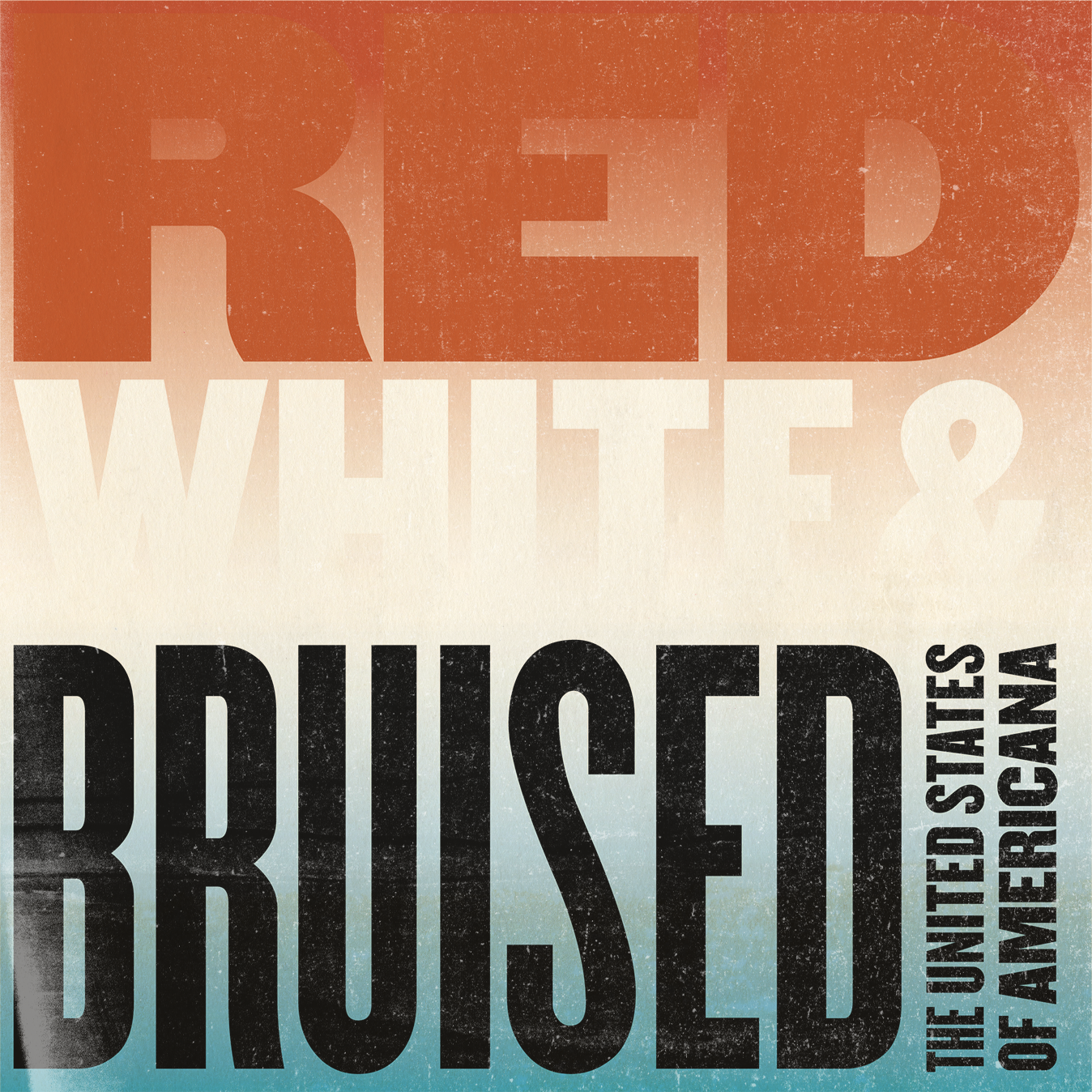Red, White, and Bruised: The United States of Americana
by Mia Mckell
In the summer of 1984, as America teetered between a Reagan-era optimism and a quiet disillusionment of the working class, a bold wave of heartland rock rolled across the airwaves. It was the seventh studio album of a New Jersey man by the name of Bruce Springsteen. The slight musician who’d once hunched over a guitar in Asbury Park bars had transformed into a broad-shouldered figure fit for stadiums and MTV. Wearing blue jeans and a white T-shirt, 34-year-old Springsteen stood in front of the flag for the now-iconic Born in the U.S.A. album cover; an image that solidified his status as a larger-than-life symbol of American rock.
More than four decades later, 75-year-old Springsteen stepped onto the stage in Manchester, England, for the first date on the European leg of his “Land of Hope and Dreams” tour with the E Street Band. Gone was the rugged youth in raw denim; in his place stood a silver-haired Springsteen in a tailored navy vest suit, with the quiet authority of a man who’d earned every line on his face. Soft melodic piano music played as he took measured steps to the front of the stage, lowering himself to sit at eye-level with the crowd. “There’s some very weird, strange, and dangerous sh*t going on out there right now.” he told them, head in his hand. “In America they are persecuting people for using their right to free speech and voicing their dissent.”
This particular speech, like many others he would go on to give on this tour, criticized the Trump administration as “corrupt, incompetent, and treasonous”, claiming that America is now led by an “unfit president”. His words threaded through the set, echoing a long career spent exploring American ideals; not as blind patriotism, but as a moral commitment to justice, dignity, and the lives of working people.
For Trump, Springsteen’s America is not one to be honored, but to be mocked. On Truth Social, the former president dismissed Springsteen’s image and ideals with characteristic bluntness. In a series of posts, he called the musician a “pushy, obnoxious JERK,” a “dried out ‘prune’ of a rocker,” and “dumb as a rock,” insisting that Springsteen “ought to KEEP HIS MOUTH SHUT until he gets back into the country.”
By the Spring of 2025, when these posts hit the news circuit, it was no great shock to the public to watch Trump go to bat against yet another musician on social media, as his political career has involved many such ‘feuds’ with various artists who’ve criticized him or denied permission to use their songs. However, it’s worthy to note that these attacks are not launched against any and all popular media figures who speak out against Trump or the MAGA movement, and if strategic, seem to get specifically directed towards those who threaten to divide his voter base. Springsteen is one such musician to strike a deeper chord with the politician; and this likely begins with his genre.
In general, country music, Americana, and heartland rock have long been linked to conservative ideals, rooted in their shared focus on patriotism, faith, rural life, and working-class identity. These genres, especially country, have often been positioned as the cultural voice of “real America,” with their imagery regularly surfacing in right-wing politics and campaign rallies. With artists like Toby Keith and Trace Adkins performing at Trump’s inauguration in 2017, and Lee Greenwood’s “God Bless the U.S.A.” becoming an unofficial anthem at Trump rallies, the idea that country music represents a version of the “heartland” defined by Trump’s political messaging has been reinforced. As a result, the genre is frequently perceived as resistant to cultural change, nostalgic for a particular vision of the past, and politically aligned with the right.
This phenomena is perfectly embodied in Bruce Springsteen; an Americana artist whose identity in popular culture is inextricably linked to the phrase ‘Born in the U.S.A.’. By default, he’s a figure easily cast as an icon of American patriotism; boasting unwavering support for the homeland via thundering chorus against the backdrop of an American flag; seamlessly co-optable by the MAGA movement. The flag itself, prominently displayed on Springsteen’s most iconic album, has become increasingly associated with MAGA politics; and as a result, many Americans, especially on the left, have grown uncomfortable with displaying it. What was once a shared civic symbol is now seen by some as connected to a movement with exclusionary, and at times, undemocratic overtones.
While things have certainly become more divided as of late, Springsteen has found himself in the crossfire of political conflict regarding the concept of American patriotism from the moment Born in the U.S.A. was released. Even to a casual observer in the 1980s, Springsteen’s album could look like an unwavering and uncritical celebration of life as an American citizen.
This was Republican President Ronald Reagan’s interpretation, who name-dropped Springsteen and Born in the U.S.A. during his 1984 re-election campaign in a stump speech, telling audiences that “America’s future” rested in “the message of hope in the songs of a man so many young Americans admire– New Jersey’s own Bruce Springsteen.” While these words were meant as praise for the musician, Springsteen was quick to reject his association with Reagan’s campaign, denying the parallels between his own lyrics and an optimistic perspective on life as an American citizen, responding publicly to his belief that “people have a need to feel good about the country they live in. But what’s happening, I think, is that that need… is getting manipulated and exploited”. Moving forward in his career, Springsteen would continue to distinguish himself from a nationalist interpretation of American pride; and in the early 2000s, he was particularly critical of how Bush used the American flag and patriotism to silence criticism, insisting that “the flag is a symbol of protection for free speech, not the other way around.”
Today, with a large part of the support for Trump’s campaign running off his claims of representing the working class, it isn’t a great look when the man dubbed in popular culture as “The Voice of the (proverbial) Working Class” over the past four decades speaks out against him. While Trump quickly lashed out against this blow, it’s clear that Springsteen’s criticism of Trump is not an outlier, rather part of a deeper commitment to defending his belief that loving one’s country means refusing to stay silent when it falls short.
Personally, when I look at the album Born in the U.S.A, I see imagery that is intentionally ambiguous, bordering on ironic. Springsteen’s back is turned to the viewer, a subtle gesture of protest. In listening, the chorus is not a celebration, but a bitter refrain. Springsteen repeats it not with pride, but with pain. He’s criticizing a country that waves the flag while turning its back on those struggling beneath it. This considered, Springsteen’s criticism of Trump is not a divergence from his legacy, but rather part of a deeper commitment he has shown to the idea that loving one’s country means refusing to stay silent when it falls short. While some may view his criticisms of the current administration as inherently anti-American, maybe they echo the most American tradition of all: holding power to account in the name of a more perfect union. In my mind, Springsteen has never viewed the flag as property of any one politician or party; he views it as a promise to the people it represents.
-Mia Mckell


